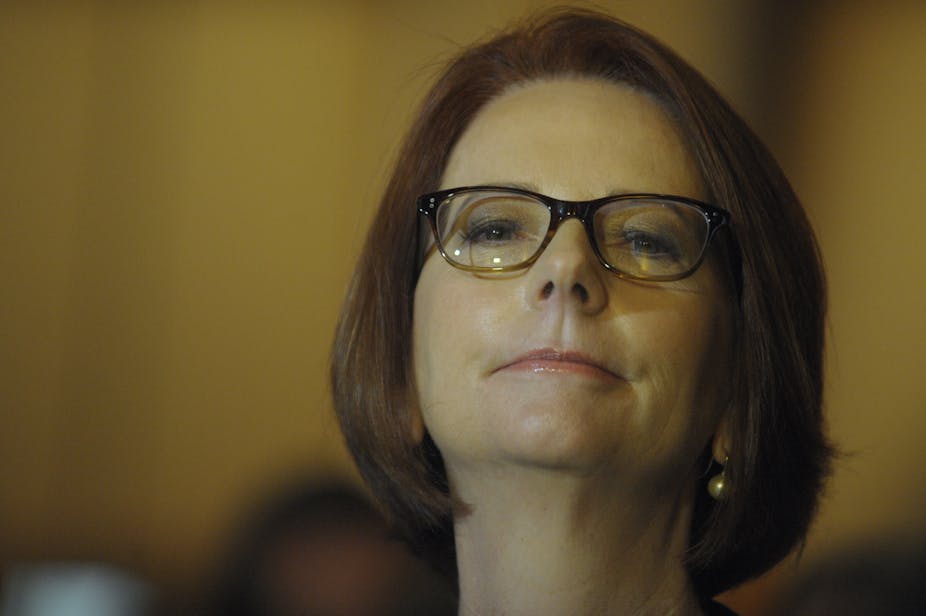Politics and identity have collided with unusual force in Australian politics over the past year, reaching a crescendo in the last week.
Beginning with Julia Gillard’s “misogyny speech” to parliament, the gender debate has now reached the point where a sitting prime minister is asked by a radio interviewer if her long-term male partner is homosexual.
This comes after a chef at a restaurant holding a Liberal Party fundraiser feels it appropriate to construct a menu inspired by her anatomy.
For a mature nation with serious politics, the condemnation of rather sophomoric puns comparing the national leader’s features to items on restaurant menu should come naturally and it mostly did.
But has Gillard overplayed gender as an issue? The most recent polling suggests that men are turning away from the current government.
The legitimacy of gender as personal and political issue in the coming election is less natural. Should misogyny and unbecoming comments be discussed in public or around the kitchen table among friends? Certainly. How about as an issue central to an election? The easy answer to this question is less certain.
Gender as an issue in leadership has provoked a larger discussion about what political scientists call political culture. The term is now used as a catch all phrase whenever political discourse turns towards tasteless vilification or when a particular norm has been broken. In common parlance, political culture is shorthand for the degree of acrimony in a polity or political community. For instance, we might say that a particular community has an “aggressive” political culture. This is meant to imply open and intense disagreement.
And indeed we do say that a polity’s political culture has “declined” when the exchange between politicians or commentators shows less restraint that it had previously. Yet this definition of political culture is only partially in line with the term’s conceptual depth.
Defining political culture by degree or intensity of conflict confuses the “proxy” or “indicator” of the concept with the concept’s deeper and more useful meaning. A more exact definition of political culture refers not to the degree of acrimony in a polity but the scope of permissible debate for politics. At first this might seem an “academic” distinction but it is a distinction with worthy significance.
Let me provide an example of differences in political culture that might illustrate what is meant by scope of permissible debate for politics. In Saudi Arabia, a permissible political discussion might be the appropriate and legally enforceable length of a woman’s skirt. It is within Saudi political culture to debate whether politics might regulate skirts. Of course, who might have that debate - men and/or women, royalty or commoner, religious or secular authority - is also within a society’s political culture.
For those who have walked in the Melbourne CBD on a Friday or Saturday night, it is apparent, especially in winter, that no such political intervention has been considered regarding regulating skirt length. In Australia, it is assumed (or has been assumed) that skirt length is determined to be outside what we talk about as a political issue.
Why is this more complete definition of political culture worth considering? In part because this conception of political culture is ultimately what is currently being debated in the subtext. Whether it is within Australia’s scope of debatable issues to make descriptive characteristics (gender, race, age, family or sexual status) an issue in political leadership or competency.
Such a debate about the scope is neither new nor distinctive to Australia. In pre-modern Europe (before 19th century), personal characteristics and professional competency were intertwined. For instance, a good baker, once cuckolded, was no longer considered a good baker. These attitudes, for the most part, have been eroded. Yet, the recent debate in part indicates friction in political culture and scope of discussable issues. Namely, what personal behaviour and descriptive characteristics should be debatable as they pertain to political leadership?
For the cultural right, personal virtue in the form of traditional norms is valued politically. Gillard is unwed and, in the cultural right’s perspective, this characteristic is within the scope of permissible political discussion for her election. For the cultural left, personal characteristics in the form of gender and race are valued politically.
Gillard is a woman, and in the cultural left’s perspective, this is within the scope of permissible political discussion for her election. There may be no easy resolution, as the debate about political culture will continue and is much deeper that the surface issues suggest. But one aspect is clear, neither side holds clearly discernible higher ground than the other.

